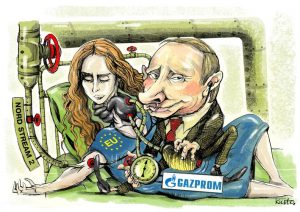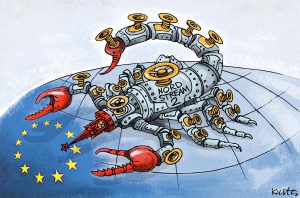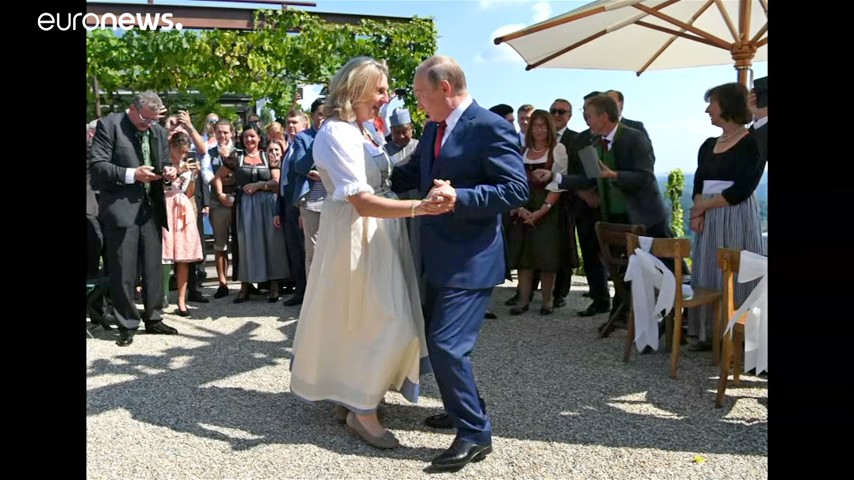The use of corruption in furthering a country’s geopolitical interests is the primary technique currently widely used by two countries – Russia and China, both of which profess revanchism against the West, namely against the EU, the US and Great Britain. Thus, awareness of corruption as a threat to national security is a priority both in the context of Ukraine and in the context of the world community.
The implementation of the Nord Stream-2 project is not just an economic but also a political strategy of the Russian Federation, which openly seeks to build interdependent ties with EU business elites. Germany and other EU member states have long-term interests in the stability of Russian development and believe that cheap energy from Russia is a good guarantee of stability of Russia’s political regime.

That is why Nord Stream cannot be seen as a purely economic project, as its tangible political consequences lead to interdependence between EU member states and Russia, as well as possible future difficulties in reorienting EU markets from cheap Russian gas.
In practice, this scenario greatly resembles the continentalist paradigm of geopolitics voiced by Russian philosopher Aleksandr Dugin, who strongly believes in and preaches Russia’s dominance over Europe and Asia.
The mere fact that Russia seeks to strengthen its ties with EU member states while Euro-Atlantic projects continue to decline will have long-term consequences, namely factionalization of the Western world, as suggested by geopolitical continentalists. Moreover, given the growing interdependence between Russia and the EU, which will be achieved through the implementation of Nord Stream-2, any projects for the further democratization of Eastern Europe and the Caucasus will be seriously questioned and their feasibility critically weakened.
Many observers and politicians openly state that the very idea of Nord Stream 2 is akin to a well-planned corruption scheme, but this is only partially true. Russia systematically uses strategic corruption to change the status quo and strike at geopolitical opponents.
Philip Zelikow, Eric Edelman, Kristofer Harrison, and Celeste Ward Gvente analyze this phenomenon in their article in Foreign Affairs The Rise of Strategic Corruption. They refer especially to the Derkach tapes (see article on Ukrainian lawmaker Andriy Derkach) and disinformation about Biden’s activities in Ukraine, which they call the most famous case of strategic corruption in recent years.
It is fundamental to understand the tool of strategic corruption itself. It consists of individual puzzles, none of which resemble anything that might be of global significance. Actions to change the geopolitical status quo are disguised as acts of ordinary corruption, lobbying or even completely admissible political activity.
Therefore, it is extremely difficult to grasp the significance of such implemented strategies when they are disguised as absolutely tactical phenomena. The authors The Rise of Strategic Corruption note that the Derkach tapes and additional disinformation were perceived in the United States as a domestic political scandal. A similar conclusion can be drawn with regard to Ukraine: the majority of Ukrainians believe that pro-Russian politician Andriy Derkach purposefully intended to harm former president Petro Poroshenko, the former head of Naftogaz Andriy Kobolyev and other powerful people.

In addition, Russia has huge economic influence in all of post-Soviet space. This makes it possible for the Kremlin to form loyal elites in neighbouring countries by building economic interdependence and creating favourable conditions for a particular political group.
In the Ukrainian context, we can point to the formation of a pro-Russian group of influence in national politics and the media around RosUkrEnergo, a graft-ridden company, which, in the 2000s, acted as the exclusive intermediary between Ukraine’s Naftogaz and Russia’s Gazprom.
Granting preferences and privileges to this company led to its interdependence with Russia’s economic and political interests, which finally resulted in the election of pro-Russian President Viktor Yanukovych. Next, Serhiy Lyovochkin, head of the Opposition Bloc and member of the RosUkrEnergo clan, was appointed Head of Yanukovych’s Administration.
As a result, democratization in Ukraine is being threatened by oligarchic interests, which take up increasingly pro-Russian positions, as evidenced by the case of Ukrainian oligarch Ihor Kolomoiskyi.
The formation of groups of pro-Russian political forces in western countries, incessant blows to Ukraine, Georgia, and Moldova’s democracy-building process, and the implementation of the Nord Stream-2 project are different versions of Russia’s strategy to change the global status quo.
Russia knows that direct military intervention and diplomatic pressure are limited options as most countries are aware of such strategies and carefully monitor Russia’s actions. However, reflexive control and strategic corruption are a much greater threat to the Western world, as they are extremely difficult to recognize and follow in practice.
That is why increased attention to any cooperation or interaction with structures affiliated with the Russian Federation should be a key prerequisite in order to prevent a geopolitical catastrophe and the defeat of the West.

Graft is nothing new; it may be the second-oldest profession. Powerful people and those with access to them have always used kickbacks, pay-to-play schemes, and other corrupt practices to feather their nests and gain unfair advantages. And such corruption has always posed a threat to the rule of law and stood in the way of protecting basic civil and economic rights.
What is new, however, is the transformation of corruption into an instrument of national strategy. In recent years, a number of countries—China and Russia, in particular—have found ways to take the kind of corruption that was previously a mere feature of their own political systems and transform it into a weapon on the global stage. Countries have done this before, but never on the scale seen today.
The result has been a subtle but significant shift in international politics. Rivalries between states have generally been fought over ideologies, spheres of influence, and national interests; side payments of one kind or another were just one tactic among many. Those side payments, however, have become core instruments of national strategy, leveraged to gain specific policy outcomes and to condition the wider political environment in targeted countries. This weaponized corruption relies on a specific form of asymmetry. Although any government can hire covert agents or bribe officials elsewhere, the relative openness and freedom of democratic countries make them particularly vulnerable to this kind of malign influence—and their nondemocratic enemies have figured out how to exploit that weakness.




